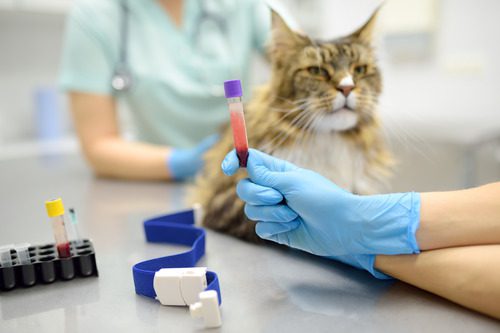Heartworm disease is a serious condition that affects many pets, but can cats get heartworm too? Understanding this disease and its impact on our feline friends is essential for their well-being. In this blog, we’ll explore the risks, symptoms, prevention, and treatment of heartworm disease in cats. If you have any concerns about your cat’s health, call us today at (386) 755-0236.

Understanding Heartworm Disease in Cats
Heartworm disease is caused by a parasitic worm called Dirofilaria immitis. While it is more common in dogs, cats can also be affected. The parasite is transmitted through the bite of an infected mosquito. When a mosquito bites a cat, it can deposit heartworm larvae into the cat’s bloodstream. These larvae then mature into adult worms, which can cause significant health issues.
How Do Cats Get Heartworms?
Cats get heartworm in a similar way to dogs. When an infected mosquito bites a cat, it transmits the larvae into the cat’s bloodstream. These larvae travel through the cat’s blood vessels and eventually settle in the heart and lungs. Over time, they mature into adult worms, which can cause severe damage to these vital organs.
Differences Between Heartworm in Cats and Dogs
While heartworm disease is more common in dogs, cats can still be affected. However, the disease manifests differently in cats. Cats typically have fewer adult worms than dogs, but even a small number can cause serious health problems. Additionally, cats are less likely to have heartworms mature to adulthood, but the presence of immature worms can still cause significant damage to the heart and lungs.
Symptoms of Heartworm Disease in Cats
The symptoms of heartworm disease in cats can vary widely. Some cats may show no symptoms at all, while others may exhibit severe signs of illness. It’s important to be aware of the potential symptoms to ensure timely veterinary care. Common symptoms of heartworm disease in cats include:
- Coughing
- Difficulty breathing
- Lethargy
These symptoms are often mistaken for other respiratory conditions, making diagnosis challenging. In more severe cases, cats may experience the following:
- Vomiting
- Weight loss
- Loss of appetite
- Sudden collapse
- Sudden death
If you notice any of these symptoms in your cat, it’s crucial to seek veterinary care immediately.
Diagnosing Heartworm Disease in Cats
Diagnosing heartworm disease in cats is more complex than in dogs. This is due to the lower worm burden and the different way the disease manifests in cats.
Diagnostic Tests
Veterinarians use several tests to diagnose heartworm disease in cats. These include blood tests to detect the presence of heartworm antibodies or antigens, as well as imaging techniques like X-rays and ultrasounds to visualize the heart and lungs.
Importance of Early Diagnosis
Early diagnosis is crucial for managing heartworm disease in cats. While there is no cure for heartworm disease, early detection allows for better management of symptoms and prevention of further complications.
Preventing Heartworm Disease in Cats
Prevention is the best approach to protecting your cat from heartworm disease. There are several effective preventive measures that can significantly reduce the risk of infection.
- Preventive Medications: Veterinarians recommend regular administration of heartworm preventive medications. These medications are available in various forms, including oral tablets, topical solutions, and injections. Consistent use of these preventives is essential to protect your cat from heartworm disease.
- Mosquito Control: Reducing your cat’s exposure to mosquitoes is another important preventive measure. Keep your cat indoors during peak mosquito activity times, use mosquito repellents approved for pets, and eliminate standing water around your home where mosquitoes can breed.
Treatment Options for Heartworm Disease in Cats
Treating heartworm disease in cats is challenging due to the unique way the disease affects them. There is no approved medication to treat heartworms in cats, unlike in dogs.
Symptomatic Treatment
The primary approach to managing heartworm disease in cats is symptomatic treatment. This includes medications to control inflammation, improve breathing, and manage other symptoms. In severe cases, surgical removal of the worms may be necessary.
Long-term Management
Long-term management of heartworm disease in cats involves regular veterinary check-ups to monitor the condition and adjust treatment as needed. Preventive measures should continue to protect against new infections.
Protecting Your Cat’s Health and Happiness
Heartworm disease is a serious and potentially life-threatening condition for cats. Understanding how cats get heartworm, recognizing the symptoms, and taking preventive measures are crucial steps in protecting your feline friend. If you suspect your cat may have heartworm disease or want to learn more about prevention, call us today at (386) 755-0236. Our team at Lake City Animal Hospital is here to help ensure your cat’s health and happiness.

